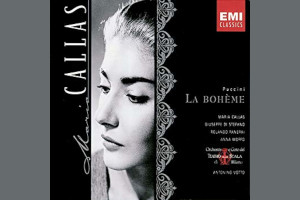Student Life
Feature Fridays La Boheme, an opera by composer Giacomo Puccini

Welcome to Feature Fridays! Every week, the AU music library staff highlights a different CD or artist from our collection. This week, Student Assistant Cameron Betchey reviews La Boheme, an opera by composer Giacomo Puccini.
La Boheme is one of the most influential and famous operas composed by Giacomo Puccini at the turn of the century. The 20th century was a time of artistic revolution and social movement, which are both themes of La Boheme. Art is an important reflection of society and communicates to the audience the struggles of people who are typically silenced for various reasons; in this case the lower classes of society. Maria Callas sings the lead, Mimi a young seamstress living in the Latin Quarter of Paris.
La Boheme was incredibly successful and it has had a lasting impact on popular culture, most notably the musical Rent, which borrows heavily in both character and plot from La Boheme. The theme of the struggling artists and impoverished workers who long for a better life or recognition from the aristocracy has been reinterpreted time and time again because it is always culturally relevant. Although it was written over 100 years ago, this opera is still emotionally and socially impactful today because of these themes.
At the height of her career, Callas is the most successful opera singer in the world, known for her uniquely powerful and emotionally expressive voice. Her ability to convey emotion through the power of her voice pairs well with the romantic nature of Puccini’s composing style. The CD I have chosen is the EMI Classics full recording of La Boheme with performances by Maria Callas, Giuseppe Di Stefano, and Rolando Panerai. This CD is part of a wide collection of opera recordings that star Callas, many of them composed by Puccini. Callas’s ability to sing lyrical, coloratura, and dramatic roles made her a rare and dynamic performer. Yet, somehow she always sounded like herself, her voice never altered in sound or quality but it was flexible enough to sing in a wide variety of styles. She is an excellent singer to listen to if you want to get a taste of a larger variety of operatic music rather than just listening to a singer who sings in one composer or era.
I would recommend this CD to anyone who is trying to listen to operatic music for the first time. The plot is intriguing and easy to follow, and the romantic era style in which Puccini writes is beautiful and musically interesting. Puccini unlike many other composers began to learn music by playing the violin not the piano. This influence is easy to hear in his music. The melodic lines are dramatic, long, and sweeping and the music is harmonically complex yet never feels too dissonant. The music is drenched in drama and emotion, made clearer to the listener through the power and expressiveness of Callas’s voice. In this way I think that La Boheme can be interesting even to people who do not listen to classical music often. Overall it is a beautiful masterpiece brought to life by one of the most talented opera singers of the 20th century with societal messages that are still resonant today.